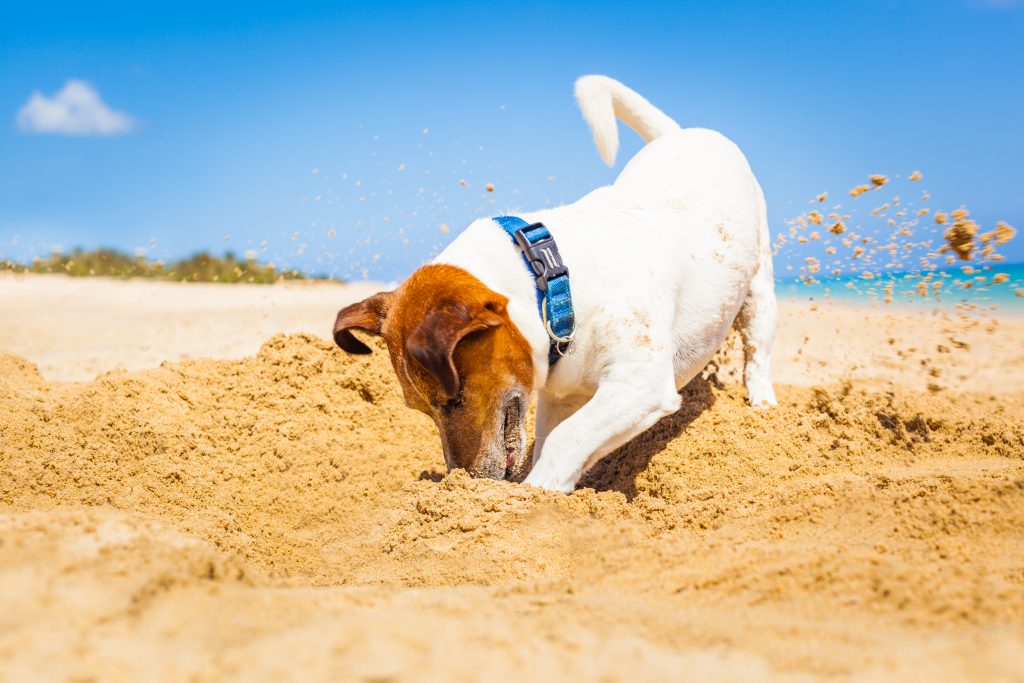It’s not only humans that have their own personality traits and strange behaviors; pets have them too. Most of their habits are oddities you have come to know well and don’t seem to far out of the ordinary once you get used to them. But do you think you’d be able to tell if your dog was experiencing obsessive compulsive behavior (OCD)? You may chalk it up to your pet’s unique personality, but really it could be something more.
OCD tendencies in dogs may include chasing their tail, barking, or chewing on a toy. But, wait, doesn’t this all seems like normal behavior? It is unless your dog is doing these activities frequently or for long periods of time. There may be more to your dog’s OCD-driven behavior than boredom or just dogs being dogs. Your pup may be experiencing anxiety, which can’t be communicated to you through words.
It’s always a good idea to be aware of odd behavior in your pets or sudden changes because they could be indicators of bigger problems. Although some of it may be temporary, especially if you have a new dog that’s becoming acclimated to new surroundings, check into it if it turns out be more permanent. It may be more than compulsive barking or what seems like never ending time spent chasing his tail that’s making your dog act the way he does. Here are a few signs to be on alert for in your pet to identify obsessive compulsive disorder in dogs.
Signs of OCD in Dogs
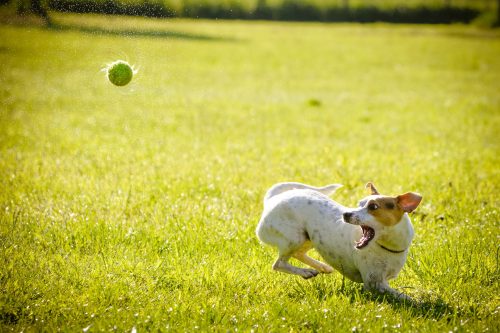
When you’re looking for signs of OCD (not to be confused with osteochondritis dissecans), look for repetition of activity. Of course, dogs will bark or occasionally chew on toys, but if it becomes a habit that happens multiple times a day or for extended periods of time, OCD may be the diagnosis.
Signs of OCD behavior includes: digging, scratching, running along the fence line in the backyard, chewing on paws, and peeing in the home. Other telltale signs your pet may have OCD include:
- Your pet is easily startled
- Your pet doesn’t like to be pet or touched
- Your pet displays aggression that’s out of the ordinary from his regular temperament
- Your pet suddenly withdraws from people or other pets he is normally familiar with
Though these kind of signs may seem like your pet is just being temperamental or territorial, if it’s unusual behavior for your pet, monitor how long the behavior lasts. If it continues for awhile, make an appointment with your veterinarian to get things checked out. It could be a habit that passes with time or it could be a disorder you and your dog will need to learn coping techniques for in order to live a calmer life.
Symptoms of OCD in Dogs
The signs are fairly easy to spot, especially if you’re used to a certain behavior from your dog and suddenly that changes. Keep track of when you began to notice a change and mark incidents of importance to relay to your veterinarian when you take your dog in for a checkup. Even if it seems minor to you, the more information you can provide, the better.
There are other symptoms that will be indicative of OCD in your pet. Just as humans who suffer from OCD have the repetitive need to wash their hands or repeat an activity a certain number of times before settling in and getting comfortable, your dog can portray similar behavior.
For example, if your pet is suffering from open wounds due to consistent licking of the same spot or has bleeding nails or paws due from excessive digging, something may be wrong. If you’ve noticed your pet has been losing a lot of fur because of endless pawing or scratching, he may be suffering from OCD.
Finally, you may even notice a change in the sound of your dog’s bark. This comes from overuse of their vocal chords from endlessly barking. Whatever you notice as a significant difference in your pet’s appearance or behavior is enough to at least pay attention to and find out if it will remedy itself over time.
What Causes a Dog’s OCD Behavior?
You may be wondering why dog behavior varies so greatly. Why are some dogs low-key and mellow, while others seem more hyper and energetic? Why do some dogs bark day and night, while others barely make a sound even when strangers are around? There are several reasons for these behavioral differences. It can be how a dog was trained, the kind of household he’s been brought up in, or it can also be due to his specific breed.
Some dog breeds are more predisposed to compulsive behaviors than others. German Shepherds and Terriers are two types of dogs that are commonly known to be tail-chasers, while Labrador Retrievers are prone to pick up items and eat them, regardless of it’s edible or not.
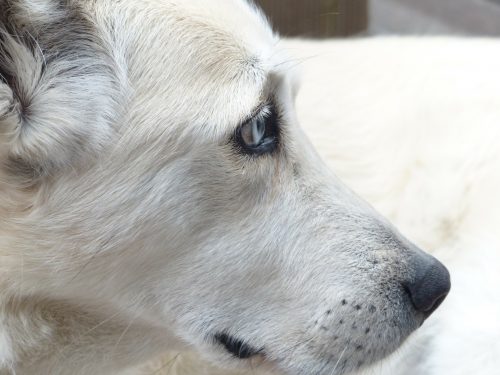
Most likely you researched information about your dog’s breed before, but you can also ask your veterinarian what kind of behavior your breed of dog is known for, so you can be on the lookout for symptoms and have a better idea of what to expect.
Then again, the sudden presence of OCD could simply be your pet seeking attention. Any dog owner can identify their own pet’s personality. They know what their dog does and doesn’t like based on past behavior. If your dog has suddenly displayed a noticeable shift, it could be due to a change in routine.
Have you been gone from the home more than usual? Do you give your dog extra attention when he’s acting up? You may be surprised what pets will do to get the attention of their owners, even if it’s not always for the most positive of reasons.
If your pet starts exemplifying OCD behavior, walk out of the room and peek in to see if it continues. If it stops, then most likely your pet is trying to get your attention. Your dog appreciates a routine and if it’s disrupted in any way, he’ll most likely find a way to express his dissatisfaction.
The thing about dogs is that no matter how smart they are, they still cannot formulate words to tell us exactly how they’re feeling or why they’re doing the things they do. Because of this, their body behavior is the biggest indicator into what they’re experiencing at any given time.
Treatment for Dogs with OCD
The first thing you’ll want to do is take your dog to the veterinarian. Odd behavior or acting out may be the cause of OCD, extra stress, or it can be a symptom of something else physically wrong with your pet. Through a physical exam and tests (if necessary), your veterinarian can rule out other disorders or diseases your dog may be suffering from.
However, if your pet is pain-free and has already been diagnosed with OCD, there are methods to help you and your pet cope with the symptoms. The first thing your veterinarian most likely will recommend is a behavior therapist for your dog. This is to help identify what triggers your pet’s behavior and how to reduce that activity and/or stress from his day-to-day life. Other coping methods or remedies might include activities designed to distract your dog, medication, and/or obedience training.
Distraction Activities – When your pet begins to start his OCD habits, a distraction like a walk or engaging in a game of fetch can keep your dog from continuous chewing, biting, or running in circles compulsively. By focusing your dog’s attention on something else, an activity that’s healthier, you will introduce him to new ways he can cope with his OCD.
Prescription Medicine – If your veterinarian feels your pet will benefit, medication may prescribed. It most likely won’t be the first phase of treatment, and your veterinarian will explain the side effects and any risks associated when prescribing the medication. If your pet is already on medication for other diseases or illnesses, it may not be a method of treatment that qualifies.
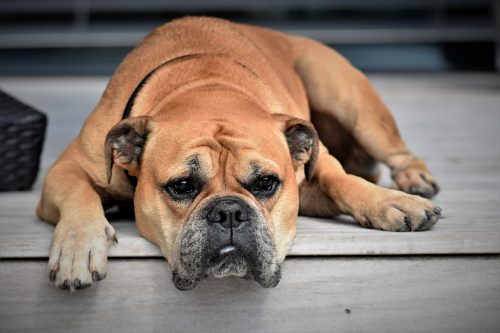
Dog Training – Routine is a common remedy for dogs who suffer from OCD. This can range from obedience school to a regular game of catch played every afternoon. If you travel a lot for work or are rarely home, it’s still important for your pet to have consistency and companionship.
Some pets also respond well to massage therapy or acupuncture to help eliminate signs and symptoms of OCD. Your dog will “tell” you how they are responding to treatment by how he reacts to it. The important thing is to make your dog feel loved and reward good behavior without punishing his OCD habits.
Can OCD in Dogs Be Prevented?
As mentioned before, sometimes OCD is hereditary in pets and is a trait associated with a certain breed of dog. However, many cases of OCD are stress-induced, which requires you to pay close attention as to what is causing extra anxiety or stress in your dog.
Is he leery of strangers? Does he jump at loud noises? Maybe he is squeamish among young children. Learn your pet’s normal behaviors so that when there are any changes, you notice the difference and can speak to your veterinarian about any specific symptoms or noticeable altered states. You can also prevent those stressful situations as much as possible to protect your pet from the anxiety to begin with.
In some cases, OCD tendencies might be a fleeting phase, especially if your pet is being house broken or is adjusting to a new environment. There is stress in those situations that may cause exaggerations in behavior as well as cause him to act out of the ordinary.
But, as always, if your pet’s behavior is causing concern, it doesn’t hurt to consult with your veterinarian. As a medical expert in animal behavior, it will help eliminate any potential diseases, allergies, or disorders. It will also help provide peace of mind for you, knowing you’re doing all you can to help your pet.
What to Do If Your Pet Has OCD
OCD in dogs might not be as uncommon as you might think. You might even have witnessed such behavior without knowing that your dog is exhibiting symptoms of the disorder. One veterinarian quoted in an ABC News article roughly estimates that 1 in every 50 dogs suffer from obsessive compulsive disorder.
The article reiterates the importance of consistency with your pet. That may include re-training your pet or setting your dog up on a more solid schedule. Your dog identifies best with routine and familiar environments. Changing this in any way can cause a spike in stress in your dog just as it can in humans.
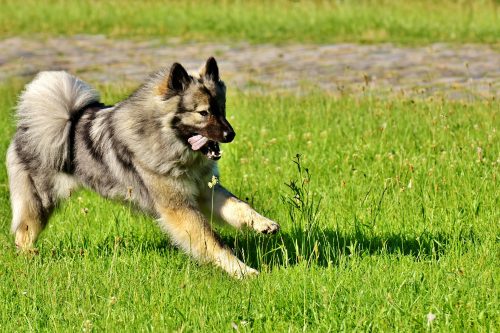
Think of how humans fidget or mindlessly twirl their hair, chew their nails, or a number of other habits they perform when under severe pressure or stress. This type of behavior translates to canines in similar forms when they gnaw on their paws, run in circles, or scratch themselves or other things continuously. It may seem like “bad” behavior when really it’s symptomatic of being triggered by something that’s causing him anxiety.
Telling your pet to stop doesn’t fix the problem, it only perpetuates it because he doesn’t have an outlet to what ails him. Instead, start or improve your dog’s daily routine. If you are unable to take your dog out during the day because of work, then think about enrolling your pet into obedience school or doggy daycare. There your dog can interact with others and trained professionals who know signs to look out for and ways to help your dog become healthier and happier.
If you’ve discovered that your dog does have OCD, don’t fret. Fortunately, your furry friend will not be in any pain, but rather may be looking for ways to harness his energy into something that isn’t as harmful or distracting to himself or others. Learn what you can from your veterinarian and seek the help of an animal behaviorist if necessary.
There are resources and ways to help your pet cope and ultimately, they’ll be in good hands because they have an owner who is looking out for his best interest and well-being.

